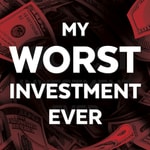My Worst Investment Ever Podcast – Détails, épisodes et analyse
Détails du podcast
Informations techniques et générales issues du flux RSS du podcast.

My Worst Investment Ever Podcast
Andrew Stotz
Fréquence : 1 épisode/3j. Total Éps: 884

Classements récents
Dernières positions dans les classements Apple Podcasts et Spotify.
Apple Podcasts
🇫🇷 France - investing
09/07/2025#92🇫🇷 France - investing
28/10/2024#99
Spotify
Aucun classement récent disponible
Liens partagés entre épisodes et podcasts
Liens présents dans les descriptions d'épisodes et autres podcasts les utilisant également.
See all- https://www.upwork.com/
1878 partages
- https://kkoslawyers.com/
1192 partages
- https://acquirersmultiple.com/
839 partages
- https://www.linkedin.com/in/thesaleswhisperer/
497 partages
- https://www.linkedin.com/in/michellebgriffin/
430 partages
- https://www.linkedin.com/in/mustafa-sherif/
428 partages
- https://www.instagram.com/
5091 partages
- https://www.instagram.com/thechrisdo
216 partages
- https://www.instagram.com/thechillmom
198 partages
Qualité et score du flux RSS
Évaluation technique de la qualité et de la structure du flux RSS.
See allScore global : 37%
Historique des publications
Répartition mensuelle des publications d'épisodes au fil des années.
Enrich Your Future 17: Take a Portfolio Approach to Your Investments
lundi 21 octobre 2024 • Durée 16:23
In this episode of Enrich Your Future, Andrew and Larry Swedroe discuss Larry’s new book, Enrich Your Future: The Keys to Successful Investing. In this series, they discuss Chapter 17: There is Only One Way to See Things Rightly.
LEARNING: Consider the overall impact of investments rather than focusing on individual metrics.
"There is only one right way to build a portfolio—by recognizing that the risk and return of any asset class by itself should be irrelevant."Larry Swedroe
In this episode of Enrich Your Future, Andrew and Larry Swedroe discuss Larry’s new book, Enrich Your Future: The Keys to Successful Investing. The book is a collection of stories that Larry has developed over 30 years as the head of financial and economic research at Buckingham Wealth Partners to help investors. You can learn more about Larry’s Worst Investment Ever story on Ep645: Beware of Idiosyncratic Risks.
Larry deeply understands the world of academic research and investing, especially risk. Today, Andrew and Larry discuss Chapter 17: There is Only One Way to See Things Rightly.
Chapter 17: There is Only One Way to See Things RightlyIn this chapter, Larry enlightens us on the benefits of considering the overall impact of investments rather than focusing on individual metrics. This holistic approach empowers investors and advisors to make more informed decisions.
Don’t view an asset class’s returns and risk in isolationA common mistake that investors and even professional advisors often make is viewing an asset class’s returns and risk in isolation. Larry emphasizes this point by giving the example of Vanguard’s popular index funds, the largest index funds in their respective categories, to make us all more cautious and aware of the potential pitfalls of this approach.
From 1998 through 2022, the Vanguard 500 Index Fund (VFINX) returned 7.53% per annum, outperforming Vanguard’s Emerging Markets Index Fund (VEIEX), which returned 6.14% per annum. VFINX also experienced lower volatility of 15.7% versus 22.6% for VEIEX. The result was that VFINX produced a much higher Sharpe ratio (risk-adjusted return measure) of 0.43 versus 0.30 for VEIEX.
Why more volatile emerging markets have a higher returnAccording to Larry, despite including an allocation to the lower returning and more volatile VEIEX, a portfolio of 90% VFINX/10% VEIEX, rebalanced annually, would have outperformed, returning 7.59%. And it did so while also producing the same Sharpe ratio of 0.43. Perhaps surprisingly, a 20% allocation to VEIEX would have done even better, returning 7.61% with a 0.43 Sharpe ratio.
Even a 30% allocation to VEIEX would have returned 7.59%, higher than the 7.53% return of VFINX (though the Sharpe ratio would have fallen slightly to 0.42 from 0.43). The portfolios that included an allocation to the lower-returning and more volatile emerging markets benefited from the imperfect correlation of returns (0.77) between the S&P 500 Index and the MSCI Emerging Markets Index.
The right way to build a portfolioLarry says there is only one right way to build a portfolio—by recognizing that the risk and return of any asset class by itself should be irrelevant. The only thing that should matter is considering how adding an asset class impacts the risk and return of the entire...
Enrich Your Future 16: The Estimated Return Is Not Inevitable
lundi 14 octobre 2024 • Durée 36:04
Apple | Listen Notes | Spotify | YouTube | Other
Quick takeIn this episode of Enrich Your Future, Andrew and Larry Swedroe discuss Larry’s new book, Enrich Your Future: The Keys to Successful Investing. In this series, they discuss Chapter 16: All Crystal Balls are Cloudy.
LEARNING: Estimated return is not always inevitable.
“If returns are negative early on, don’t withdraw large amounts because when the market eventually recovers, you won’t have that money to earn your returns.”Larry Swedroe
In this episode of Enrich Your Future, Andrew and Larry Swedroe discuss Larry’s new book, Enrich Your Future: The Keys to Successful Investing. The book is a collection of stories that Larry has developed over 30 years as the head of financial and economic research at Buckingham Wealth Partners to help investors. You can learn more about Larry’s Worst Investment Ever story on Ep645: Beware of Idiosyncratic Risks.
Larry deeply understands the world of academic research and investing, especially risk. Today, Andrew and Larry discuss Chapter 16: All Crystal Balls are Cloudy.
Chapter 16: All crystal balls are cloudyIn this chapter, Larry illustrates why past returns are not crystal balls that predict future returns.
According to Larry, the problem with all forecasts that deal with estimations of probabilities is that people tend to think of them in a deterministic way. He says that as an investor, you should think about returns with the idea that distribution and estimate are only the middle points.
Your plan has to be prepared for either the good tail to show up, which is easy to deal with and usually will allow you to take chips off the table and reduce your risk because you’ll be well ahead of your goal. But if the bad tail shows up, you may have to either work longer, plan on saving more, or rebalance, which means buying stocks at a tough time.
The threat of sequence riskTo demonstrate the danger of sequence risk, Larry asks us to imagine it’s 1973, and stocks have returned 8% in real terms and 10% in nominal returns. We’ve had similar results over the next 50 years. Say an investor in that time frame decides to withdraw 7% yearly from their portfolio in real terms because they know with their clear crystal ball that they will get 8% for the next 50 years.
This means if they take out, say, $100,000 in the first year, and inflation is 3%, to keep their actual spending the same, they have to take out $103,000. According to Larry, this investor will be bankrupt within 10 years due to the sequence of returns, which is the order in which the returns occur, not the returns themselves.
As you can see in the table below, despite providing an 8.7% per annum real return over the 27 years, because the S&P 500 Index declined by more than 37% from January 1973 through December 1974, withdrawing an inflation-adjusted 7% per annum in the portfolio caused it to be depleted by the end of 1982—in just 10 years! (Note that from January 1973 through October 1974, when the bear market ended, the...
Enrich Your Future 10: You Won’t Beat the Market Even the Best Funds Don’t
lundi 19 août 2024 • Durée 27:18
In this episode of Enrich Your Future, Andrew and Larry Swedroe discuss Larry’s new book, Enrich Your Future: The Keys to Successful Investing. In this series, they discuss Chapter 10: When Even the Best Aren’t Likely to Win the Game.
LEARNING: Refrain from the futile pursuit of trying to beat the market.
“Only play the game of active management if you can truly identify an advantage you have, like inside information, but you have to be careful because it’s illegal to trade on it. Also, play only if you place a very high value on the entertainment.”Larry Swedroe
In this episode of Enrich Your Future, Andrew and Larry Swedroe discuss Larry’s new book, Enrich Your Future: The Keys to Successful Investing. The book is a collection of stories that Larry has developed over 30 years as the head of financial and economic research at Buckingham Wealth Partners to help investors. You can learn more about Larry’s Worst Investment Ever story on Ep645: Beware of Idiosyncratic Risks.
Larry deeply understands the world of academic research and investing, especially risk. Today, Andrew and Larry discuss Chapter 10: When Even the Best Aren’t Likely to Win the Game.
Chapter 10: When Even the Best Aren’t Likely to Win the GameIn this chapter, Larry illustrates why individual investors should refrain from the futile pursuit of trying to beat the market.
It seems logical to believe that if anyone could beat the market, it would be the pension plans of the largest U.S. companies. Larry lists a few reasons this is a reasonable assumption:
- These pension plans control large sums of money. They have access to the best and brightest portfolio managers, each clamoring to manage the billions of dollars in these plans (and earn hefty fees). Pension plans can also invest with managers that most individuals don’t have access to because they don’t have sufficient assets to meet the minimums of these superstar managers.
- Pension plans always hire managers with a track record of outperforming their benchmarks or, at the very least, matching them. Not the ones with a record of underperformance.
- Additionally, pension plans will always choose the manager who makes an excellent presentation, explaining why they succeeded and would continue to succeed.
- Many, if not the majority, of these pension plans hire professional consultants such as Frank Russell, SEI, and Goldman Sachs to help them perform due diligence in interviewing, screening, and ultimately selecting the very best of the best. These consultants have considered every conceivable screen to find the best fund managers, such as performance records, management tenure, depth of staff, consistency of performance (to make sure that a long-term record is not the result of one or two lucky years), performance in bear markets, consistency of implementation of strategy, turnover, costs, etc. It is unlikely that there is something that you or your financial advisor would think of that they had not already considered.
- As individuals, we rarely have the luxury of personally interviewing money managers and performing as thorough a due diligence as these consultants. We generally do not have professionals helping us avoid mistakes in the process.
- The fees they pay for active management are typically lower than the fees individual investors...
Thomas Chua – Have a Proper Sell Thesis When Investing
dimanche 27 août 2023 • Durée 24:38
BIO: Thomas Chua is the founder of SteadyCompounding.com, where he writes about business breakdowns, investment concepts, and timeless lessons from super investors.
STORY: Thomas invested in a company that had a gaming and e-commerce business. The gaming business was his main attraction, but over time, it started faltering. Unfortunately, Thomas held on until the stock went too low.
LEARNING: Have a proper sell thesis when it comes to investing, especially for smaller companies. Always write down why you should buy certain companies and what will cause you to sell them. When investing in small to mid-companies, ensure you’re adequately diversified.
“Start writing down what would cause you to sell the company to assess the risks and also to prepare yourself for the future.”Thomas Chua
Guest profile
Thomas Chua is the founder of SteadyCompounding.com, where he writes about business breakdowns, investment concepts, and timeless lessons from super investors.
Steady Compounding provides investing insights and business breakdowns every week to thousands of readers. You can sign up here for free.
Worst investment everThomas started initiating a position in a company back in 2019. The company, Sea Limited, had two business arms, gaming and E-commerce. When Thomas first bought a position in this company, its market cap was about $14 billion. The gaming business, Garena, had a revenue figure of about 1.1 billion, and its operating income was 530 million, so the operating margins were high at about 50%. The company was growing at a 100% rate. The E-commerce business, Shopee, was also growing quickly but was unprofitable.
Thomas was attracted to the company’s stock due to Garena’s success. It had a decent valuation compared with what other gaming companies were trading at.
When COVID-19 hit, the stock took off. Everybody on Twitter was crazy about this company. Thomas got absorbed into the whole narrative that Sea Limited had become invincible. Like anything they touched, they turned into pure gold.
The thesis behind Sea Limited was that Garena would finance Shopee until it became the most dominant player in whichever market it entered. Shopee’s management got a bit hot-headed back then. They started to go everywhere, and it was doing well in revenue.
The problem with this thesis was that Garena started to falter. Much of its growth came from developing countries like Indonesia and India. At some point, India banned Garena’s Free Fire game. Also, as COVID-19 started to ease, the number of users on Garena began to reduce. The stock took a tumble. When Thomas first bought the company, the stock was over $30. Then it went all the way up to over $300. Now it went down to below $30.
Lessons learned- Have a proper sell thesis when it comes to investing, especially for smaller companies.
- Before investing, always write down why you should buy certain companies and what will cause you to sell them.
- When investing in small to mid-companies, ensure you’re adequately diversified.
Andrew’s takeaways
- Be careful about just trying to build up a portfolio of small or medium-sized companies that you believe will be the next big thing because outcomes can be highly variable.
- When you feel that you need to sell, sell 10% first.
Actionable advice
Start writing down why you buy and conduct a premortem to help you decide...
Kat Merchant – Do It Today
mercredi 23 août 2023 • Durée 34:31
BIO: Kat Merchant is a Rugby World Cup Champion turned Lifestyle, Nutrition & Fitness Coach. Her mission is to show you how your weight-loss journey and making positive lifestyle and nutrition changes can catalyze improvement in EVERY aspect of your life.
STORY: Kat had to retire early from her successful rugby career. A few years after that, she went through an awful breakup. At the same time, the world went into a lockdown because of COVID-19. She decided to spend all her energy trying to get back control of her life. So, she overtrained. The more she worked out, the more she felt empty inside, even though her outside was transforming.
LEARNING: You can’t help people if you’re not in a good place. Be careful and choose how you spend your energy. People don’t care about you nearly as much as you think they do.
“You cannot help people if you’re not in a good place yourself.”Kat Merchant
Guest profile
Kat Merchant is a Rugby World Cup Champion turned Lifestyle, Nutrition & Fitness Coach. Her mission is to show you how your weight-loss journey and making positive lifestyle and nutrition lifestyle changes can be the catalyst for improvement in EVERY aspect of your life.
From boosting your career performance to enhancing your personal relationships and mental well-being, turning sweat into success is what she lives for.
Through her bespoke coaching program, Elite-14, she provides tailored strategies, support, and accountability to help you achieve your health and wellness goals and, ultimately, lead a happier and more balanced life.
Worst investment everKat had her very successful rugby career cut short due to too many concussions. She was just 28 years old at the time. A few years after that, she went through an awful breakup. At the same time, the world went into a lockdown because of COVID-19.
Kat didn’t know who she was anymore because she didn’t have rugby. She’d completely lost her confidence. Kat spent all her energy trying to regain control of her life. She wanted to look feminine and feel confident. So Kat overtrained and did exercises she didn’t like. For instance, Kat loved lifting, but because she was trying to get rid of her muscles, she did loads and loads of cardio. Kat got obsessed and weighed herself every day. The more she worked out, the more she felt empty inside, even though her outside was transforming.
Lessons learned- You can’t help people if you’re not in a good place.
- Be careful and choose how you spend your energy.
- Do things that are right for you.
- You don’t have to change yourself for anyone else. Change yourself for you if you want to.
Andrew’s takeaways
- Your whole life’s mission should be to become more you.
- People don’t care about you nearly as much as you think they do.
Actionable advice
If something’s an issue and you can change it, do it now before it becomes too late or before you go through rock bottom pain. Just change it.
Kat’s recommendationsCheck Kat out on social media, where she shares valuable tips on how to lose fat, build muscle, stay motivated, and set yourself up for success. If you want to make that change and need support and accountability, drop Kat a message, and she’ll talk to you about her one-on-one program,
No.1 goal for the next 12 monthsKat’s number one goal for the next 12 months is to keep getting fitter, stronger, and confident. Business-wise, Kat wants to keep...
Laurent Lequeu – Sizing Is Crucial When Trading
dimanche 20 août 2023 • Durée 25:48
BIO: Laurent Lequeu is a multi-asset investor dedicated to assisting High Net Worth Individuals and Retail Investors in achieving financial success through actionable investment insights derived from comprehensive global macro trends and meticulous bottom-up analysis.
STORY: Laurent thought he could outsmart all the hedge funds and the most brilliant investors by shorting NVIDIA before the first quarter results. His thesis was that the stock was an extended and overcrowded trade. However, people were still interested in the stock, so the price didn’t fall as Laurent expected. Consequently, he made a loss.
LEARNING: Sizing is crucial, especially in a short position. Apply risk management when investing. Accept that you’re going to be wrong.
“You have to admit that you’re wrong and that the market is always right.”Laurent Lequeu
Guest profile
Laurent Lequeu is a multi-asset investor dedicated to assisting High Net Worth Individuals and Retail Investors in achieving financial success through actionable investment insights derived from comprehensive global macro trends and meticulous bottom-up analysis.
Laurent is a global citizen with a mission to enhance financial literacy and empower individuals worldwide through education.
Worst investment everNot too long ago, Laurent thought he could outsmart all the hedge funds and the most brilliant investors by shorting NVIDIA before the first quarter results. His thesis was that the stock was an extended and overcrowded trade. However, people were still interested in the stock, so the price didn’t fall as Laurent expected. Consequently, he made a loss.
Lessons learned- Sizing is crucial, especially in a short position.
- Apply risk management when investing.
Andrew’s takeaways
- You have to accept that you will be wrong, and when you get it wrong, be willing to exit, particularly in a short position.
- If you don’t admit you’re wrong, the market will admit it for you.
Actionable advice
Before you enter the trades, know how much you can lose. Knowing what you can lose is more important than knowing what you can win. Also, admit that you’re wrong because there’s nothing wrong with being wrong. This is an industry where you must be right more often than wrong, but you will be wrong eventually.
Laurent’s recommendationsLaurent recommends focusing on personal learning and personal development regarding financial literacy.
No.1 goal for the next 12 monthsLaurent’s number one goal for the next 12 months is to be fully dedicated to his new company, which is focusing on improving financial literacy for everyone. He also wants to democratize and demystify macro investing.
Parting words“Unlock your individual financial success and learn to be financially independent.”Laurent Lequeu
[spp-transcript]
Connect with Laurent Lequeu
David Kass – Don’t Invest in a Company Unless the CEO Owns a Large Stake
jeudi 17 août 2023 • Durée 53:36
BIO: Dr. David Kass received his Ph.D. in Business Economics from Harvard University and has published articles in corporate finance, industrial organization, and health economics. He currently teaches Advanced Financial Management.
STORY: In his early 20s, David invested $2,000 in a company giving out high dividends. Only after he invested did he realize that none of the senior executives in the company owned its shares. Soon enough, the stock went down to zero due to accounting fraud.
LEARNING: Only invest in a company if senior executives, especially the CEO, own a significant stake. The value of the CEO’s stock in his own company to his annual salary should be at least 3:1.
“Look carefully at proxy statements and make sure the CEO and other senior managers have skin in the game, that their interests are likely aligned with yours and have a large stake through their stock holdings.”Dr. David Kass
Guest profile
Dr. David Kass received his Ph.D. in Business Economics from Harvard University and has published articles in corporate finance, industrial organization, and health economics. He currently teaches Advanced Financial Management.
Before joining the Smith School faculty in 2004, he held senior positions with the Federal Government (Federal Trade Commission, General Accounting Office, Department of Defense, and the Bureau of Economic Analysis).
Dr. Kass has recently appeared on Bloomberg TV, CNBC, PBS Nightly Business Report, Maryland Public Television, Business News Network TV (Canada), FOX TV, Bloomberg Radio, Wharton Business Radio, KCBS Radio, American Public Media’s Marketplace Radio, and WYPR Radio (Baltimore), and has been quoted on numerous occasions by The Wall Street Journal, Bloomberg News, The New York Times and The Washington Post, where he has primarily discussed Warren Buffett, Berkshire Hathaway, the economy, and the stock market.
He has also launched a Smith School “Warren Buffett” blog. Dr. Kass has accompanied MBA students on trips to Omaha for private meetings with Warren Buffett and Finance Fellows to Berkshire Hathaway’s annual meetings.
Dr. Kass received a Smith School “Top 15% Teaching Award”, a “Distinguished Teaching Award (Top 10%),” and the prestigious “Krowe Teaching Award” on two occasions.
Worst investment everDavid was fortunate to start as an investor in the stock market at age 12, courtesy of his grandfather, who gave him a gift of five shares of a $20 stock. Since then, David started following the market.
Fast forward ten years or so, in his early 20s, when David was working and earning some money investing in the stock market. In 1969 the stock market was doing reasonably well, and a stock caught David’s attention. Back then, every day, the Wall Street Journal, New York Times, or Financial News would list the ten most active stocks by number of shares traded. Near the top of the list was this computer software company called Scientific Resources. It had a common and preferred stock. David noticed that the preferred stock was paying a 9% dividend yield.
David didn’t understand the relationship between risk and return then. The average stock in the stock market then had an average dividend yield of 3%. Cash dividends were higher because more companies back then did not buy back their shares. They’d return capital to shareholders through a cash dividend. So a stock paying 9% was a huge deal. David bought 100 shares at $20 per share. The $2,000 was all the money he had to invest at the time. Then the share price started going down daily.
Once a year, shareholders would be asked to vote under SEC...
Christopher Panagiotu – Go With Your Gut, but Verify
jeudi 10 août 2023 • Durée 32:10
BIO: Christopher Panagiotu hosts the “CAPitalize Your Finances” podcast and is the original CAPitalizer: one who is obsessed with understanding what there is to know about their passion.
STORY: Chris was suckered into buying Ford and GameStop shares by the high dividends the companies were offering. However, both companies couldn’t afford to pay those dividends. Chris also started a business to steal customers from his father, whom he despised. The business lasted only seven months, and it was a complete failure.
LEARNING: When in doubt, read more. Acknowledge that you made a mistake, and move on. Never invest in a company because of a celebrity CEO, founder, or CFO.
“Always keep capitalizing.”Christopher Panagiotu
Guest profile
Christopher Panagiotu hosts the “CAPitalize Your Finances” podcast and is the original CAPitalizer: one who is absolutely obsessed with profoundly understanding what there is to know about their passion.
Worst investment everChris bought the Ford stock, which he admits was a lackluster stock. Alan Mulally had saved Boeing and left the company for Ford. Mulally was the reason Chris invested in Ford. The celebrity CEO turned it around, so Chris hung on to the stock, but for too long. Chris was suckered into Ford’s high dividend, but he soon realized that the company couldn’t afford to pay that dividend.
Another poor investment that Chris made was investing in GameStop. He was a gamer growing up, and in the 2000s, Gamestop was it. GameStop hooked Chris with the same thing that Ford did. Their dividend was huge, but they couldn’t afford it.
Aside from stocks, Chris’s worst investment ever includes a business that he started to steal customers from his father, whom he despised. The company lasted only seven months, and it was a complete failure.
Lessons learned- When in doubt, read more.
- Go with your gut, but verify.
- Humble yourself, acknowledge that you made a mistake, and move on.
- Never invest in a company because of a celebrity CEO, founder, or CFO.
- Don’t try to steal business out of spite.
Andrew’s takeaways
- Trees don’t grow to the sky, so there are very few stocks that you can hold forever.
- If you’re not getting trust from your business or personal relationships, walk away and get it elsewhere.
Actionable advice
Surround yourself with amazing people and level up with the people in your life.
Christopher’s recommendationsIf you want free content, head to Spotify and subscribe to CAPitalize Your Finances. Chris publishes new interviews with celebrities from all walks of life every Monday. They talk about capitalizing on your finances if you pursue that career. He also gives up-to-date, top-of-the-line research.
You can also buy Chris’s book on Amazon to learn more from him. If you want to follow Chris on social media, head to Instagram, LinkedIn, or
ISMS 29: Larry Swedroe – The Shiny Apple is Poisonous and Information is Not Knowledge
dimanche 6 août 2023 • Durée 55:47
In this episode of Investment Strategy Made Simple (ISMS), Andrew gets into part two of his discussion with Larry Swedroe; Ignorance is Bliss. Today they discuss two chapters of Larry’s book Investment Mistakes Even Smart Investors Make and How to Avoid Them. In this ninth series, they discuss mistake number 16: Do You Fail To See The Poison Inside the Shiny Apple? And mistake number 17: Do You Confuse Information With Knowledge?
LEARNING: Trust, but verify even when working with a financial advisor. Don’t confuse information with knowledge when buying individual stocks.
“One of the rules of investing is you should always ask an advisor if they put their money where their mouth is.”Larry Swedroe
In today’s episode, Andrew continues his discussion with Larry Swedroe, head of financial and economic research at Buckingham Wealth Partners. You can learn more about Larry’s Worst Investment Ever story on Ep645: Beware of Idiosyncratic Risks.
Larry deeply understands the world of academic research and investing, especially risk. Today Andrew and Larry discuss a chapter of Larry’s book Investment Mistakes Even Smart Investors Make and How to Avoid Them. In this ninth series, they discuss mistake number 16: Do You Fail To See The Poison Inside the Shiny Apple? And mistake number 17: Do You Confuse Information With Knowledge?
Missed out on previous mistakes? Check them out:
- ISMS 8: Larry Swedroe – Are You Overconfident in Your Skills?
- ISMS 17: Larry Swedroe – Do You Project Recent Trends Indefinitely Into the Future?
- ISMS 20: Larry Swedroe – Do You Extrapolate From Small Samples and Trust Your Intuition?
- ISMS 23: Larry Swedroe – Do You Allow Yourself to Be Influenced by Your Ego and Herd Mentality?
- ISMS 24: Larry Swedroe – Confusing Skill and Luck Can Stop You From Investing Wisely
- ISMS 25: Larry Swedroe – Admit Your Mistakes and Don’t Listen to Fake Experts
- ISMS 26: Larry Swedroe – Are You Subject to the Endowment Effect or the Hot Streak Fallacy?
- ISMS 27: Larry Swedroe – Familiar Doesn’t Make It Safe and...
ISMS 28: Stocks for the Long Run
mardi 1 août 2023 • Durée 14:50
Click here to get the PDF with all charts and graphs
What long-term return do you expect for US stocks?In Siegel’s “Stocks for the Long Run,” he tells us to expect a 5% LT real US stock market return I became a finance teacher in Thailand in 1992Then started as a financial analyst in 1993
- Higher inflation and higher nominal stock market returns, but only slightly higher real returns
- Slightly lower real LT bond return, near zero ST bond return
Post WWII/Bretton Woods 75 years of high inflation
- Real stock returns up slightly
- Real LT bond returns down
- Real ST bond returns down to zero
- Gold outperformed ST bonds
The 21 years after the Dot Com bubble saw an unprecedented level of globalization
- Inflation was down, and real US stock returns also down
- Real US LT bond returns up
- Nominal ST bond collapse, and real returns turn neg.
- Gold beats all
Siegel’s advice
- Over the long-term, an investor has paid about 15x PE for about 6-7% after inflation US stock market return
- In the future, expect to pay about 20x PE for about 5% after inflation return
Click here to get the PDF with all charts and graphs
Andrew’s books- How to Start Building Your Wealth Investing in the Stock Market
- My Worst Investment Ever
- 9 Valuation Mistakes and How to Avoid Them
- Transform Your Business with Dr.Deming’s 14 Points
Andrew’s online programs









